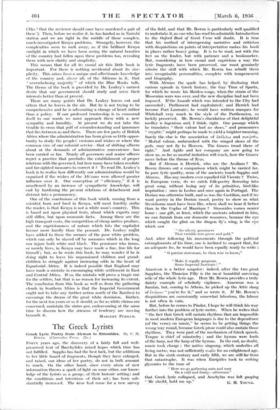The Greek Lyrists Greek Lyric Poetry from Alcman to Simonides.
By C. M. Bowra. (Clarendon Press. 2ls.) FORTY years ago, the discovery of a fairly full and well- preserved text of Bacehylides raised hopes which time has
not fulfilled. Sappho has had the best luck, but the additions to her little hoard of fragments, though they have enlarged, and raised, our ideas of her poetry, do not in bulk amount to much. On the other hand, since every atom of new information throws a spark of light on some other, our know- ledge Of the lyrists as a group; of their historic setting ; and the conditions and intentions of their art; has been sub- stantially increased. The time had come for a new survey of the field, and that Mr. Bowra is particularly well qualified to undertake it, no one who has read his admirable Introduction to the Oxford Book of . Greek Verse will doubt. It is true that his method of interspersing narrative . and criticism with disquisitions on points of interpretation makes his book in places rather heavy going. It is to be read, not with the feet on the fender, but with patience and a bookmarker. But, considering in how casual and capricious a way the lyric fragments have been preserved, one must genuinely admire the skill with which Mr. Bowra has rebuilt them into recognisable personalities, complete with temperament and biography.
With Alcman the spade has helped, by disclosing that curious episode in Greek history, the Gay Time of Sparta, for which he wrote his Maiden,songs, when the strain of the Messenian wars was over, and the new discipline had not been imposed. If the Assault which was intended to the City had succeeded ; Parliament had capitulated ; and Herrick had become Poet Laureate; he would have written masques for Whitehall very much in the style of the Partheneion, so luckily preserved. Mr. Bowra's elucidation of that delightful medley is ingenious and, I think, right. One passage which lie translates " their valour had no shoes," and pronounces " cryptic," might perhaps be made to yield a brightermeaning.
Surely the clue is the association of clgriSLA.os and rorlio-Oid. " Mortal valour, unfurnished with the . winged shoes of the gods, may not fly to Heaven. The Graces tread there of right." And Agido and her company arc now going to show us, so far as mortal imitation will reach, how the Graces move before the throne of Zeus.
But if Alcman is Herrick, who are the Aeolians ? Mr.
Bowra throws out a comparison which might be carried far. In pure lyric quality, none of the ancients touch Sappho and Aleaeus. Has any modern ever equalled Gil Vicente ? Twice, in European verse, do we catch folk-poetry flowering into great song, without losing any of, its primitive, bird-like inspiration : once in Lesbos and once again in Portugal. The Dorian was otherwise built, and so was the Castilian, and if we want poetry in the Dorian mood, poetry to show us what Stesichorus must have been like, where shall we hear it better than in the Coplas' of Manrique ? Simonides comes nearer home : one gift, at least, which the ancients admired in him, we can furnish from our domestic resources, because the eye which caught the glint on the dragon fly's wing, is the 'eye which saw
" the silvery gossamers That twinkle into green and gold."
And, after following his movements through the political entanglements of his time, one is inclined to suspect that, for an adequate fee, he would have been equally ready to write :
" 0 patriot statesman, be thou wise to know,"
and
" Make it regally gorgeous, Some Imperial Institute I "
Anacreon is a better songster : indeed, after the two great. Sapphics, the Thracian Filly is the most beautiful surviving
relic of the whole lyric age. Here Mr. Bowra provides a truly dainty example of scholarly vigilance. Anacreon was a Samian, but, coming to Athens, he picked up the Attic slang of Zroip.oe, " you're for it," and so wrote it. If Mr. Bowra's disquisitions arc occasionally somewhat laborious, the labour is not often in vain.
But, before he comes to Pindar, I hope.he will think his way further into the problem of lyric metre. When he writes that " the fact that Greek will sustain rhythms that are impossible in most modern European languages is due to the dependence (of the verse) on music," he seems to be getting things the wrong way round, because Greek prose could also sustain those rhythms. They were part of the mechanism of Greek speech. Tongue is chief of minstrelry ; and the hymns were lords of the harp, not the harp of the hymns. In the end, no doubt, music took charge ; the native singsong, which underlies all
living metre, was not sufficiently orockw for an enlightened age. But in the sixth century and early fifth, we are still far from that catastrophe. It was when Euripides took to writing
glyconics to the tune of
" Here we go gathering nuts and may On a cold and frosty-.—afternoon'
that Greek lyric collapsed, and Aeschylus was left gasping
















































 Previous page
Previous page